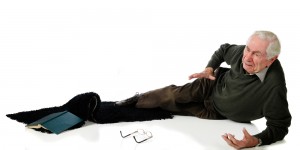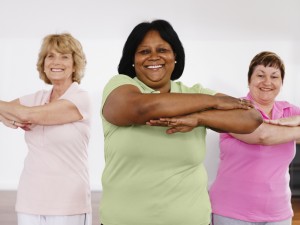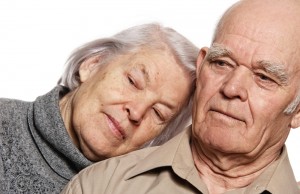
Cognitive decline and functional deterioration are core features of dementia. While falls are common in older people, this risk increases in older people living with dementia (PLWD), with 50-80% recorded to fall in a 12-month period, with poorer recovery, and an increased risk of fractures, hospitalisation and long-term care.
Some group and home-based exercises programmes, focused on strength, balance and endurance, have been found to decrease the rate of falls in older people with no cognitive impairment with a history of falling.
However, fewer studies have investigated the effectiveness of these programmes among PLWD who are still living at home, which is the focus of this systematic review and meta-analysis by Burton and colleagues (2015).

50-80% of older people living with dementia are recorded to fall in a 12-month period
Methods
Burton and colleagues included any peer-reviewed articles (randomised controlled trials [RCTs] and quasi-experimental trials) published between 2000 and 2014, which included:
- participants who were aged 60+,
- with a diagnosed cognitive impairment or dementia,
- and importantly, were living in the community, rather than in a care home.
The studies had to investigate the effectiveness of exercise programmes targeting reducing risk of falls. Where possible, results were then pooled and meta-analyses were conducted.
Results
In total, 4 studies were included, with three RCTs (Pitkala et al., 2013; Suttanon et al., 2012; Wesson et al., 2013) and one single-group pre- and post-test pilot study (Mackintosh and Sheppard et al., 2005).
There was a large variation in the number of participants, with between 22 to 210 participants across the four studies.
Interventions
In all 4 studies, there was an individualised home-exercise condition, assessed and monitored by health professionals, as compared with usual community care. Pitkala and colleagues also included a group-based exercise programme. Programmes included lower limb strengthening and weight bearing, walking, balance exercises, and one used an evidence-based exercise programme called ‘Otaga’.
There were a wide range of measurements across the studies:
- Three of the four studies reported the number of falls and two the rate of falling.
- Apart from these and the Physiological Profile Assessment (PPA) and Hill Step Test, no other (physical or falls efficacy) measurements were used in more than one study.
- Two studies also measured foot health, medication, walking aids, and vision assessments.
Study quality
Assessed using the Cochrane Collaboration’s established protocol for assessing study quality, the three RCTs were judged to have a low risk of bias.
Some methodological weaknesses were identified for the pilot study due to the single group pre-and post-test.
Effectiveness of Intervention programmes
The results were mixed:
- One study found a beneficial effect of exercise programmes on functional independence and fewer falls during the follow-up year (Pitkala et al., 2013).
- One reported significant improvements for ‘functional reach’ and the Falls Risk for Older People–Community score (Suttanon et al., 2012).
- The other two found smaller trends towards lower rate and risk of falls (Wesson et al. 2013, Mackintosh & Sheppard, 2005).
Meta-analysis
- Only three studies were included in the meta-analysis as one was removed due to differences between participants in the two conditions at baseline.
- The mean number of falls was found to be lower in the exercise group after the intervention period as compared to the control group.
- Sub-group analysis indicated slightly greater benefit for home than group-based exercise. However, this was based on one study alone.
- When considering fallers vs non fallers, on completion of the exercise intervention period, the risk of being a faller fell by 32%.
- Comparisons were also run for other outcome measures (PPA and Hill Step Test) but no significant difference was found after intervention.

The meta-analysis found that exercise reduced the risk of falling by 32%, but more research is needed before this can be considered a reliable finding.
Conclusion
The authors concluded that:
the meta-analyses demonstrated that exercise programs could potentially reduce falls for older people with dementia living in the community.
However, they highlighted that these results should be treated with caution, given small sample sizes across the studies, inconsistencies between the interventions and differences in outcome measures used.
Discussion
So, what now? Concerns were raised by the authors that the studies did not always meet the recommendations made by ProFraNe (a 2005 international working group looking at falls prevention), which highlighted the need for improved definitions and standardisation of key measures between fall prevention studies. Indeed, only one study had a 12-month follow-up and only two included definitions of falls, with falls measured in different ways across the board. Future research should involve adequately powered trials with larger sample sizes, standardised measurement outcomes and longer follow-up periods.
These studies should get us thinking about modifying exercise programmes for people with dementia, and the tentative evidence suggests a potential to implement structured exercise programmes in the community, by engaging carers and having regular contact with professionals.
As a clinician in a memory service, I really agree with the highlighted concerns in considering the level of carer involvement required to ensure safe and regular exercise, on top of the many other things carers do for their loved ones. Again and again the need for caregiver input to support the programmes was highlighted, and a trend toward increased carer burden in the intervention group was reported by Wesson and colleagues, with one-third discontinuing due to caregiver health or burden (Suttanon et al).

So, in trying to increase physical ability to reduce falls and the need for hospitalisation or care, programmes may actually increase carer burden, and consequently increase the risk of admission!
The review concluded that:
The programme can be undertaken either at home, in a group at a community centre, or in a gymnasium.
Now, if indeed a group session can be beneficial to reduce falls (although the findings here do not conclusively indicate this as yet), then an embedded group session in a day centre could serve as respite and be part of a system that reduces the burden for carers, rather than increasing it (Mackintosh & Sheppard, 2005) and integrate couples into enjoyable activities (e.g. the Movement for the Mind club run in Wiltshire), the community and services.
Interestingly, the group intervention was found to decrease the use of health and social services, probably because of the respite it provided for carers (Pitkala et al). Longer follow ups, with integrated carer support and education programmes, may help us to understand if over time a reduced risk of falls can increase independence in PLWD, and maybe even help to decrease carer burden.
Links
Primary study
Burton E, Calvalheri V, Adams R et al. Effectiveness of exercise programs to reduce falls in older people with dementia living in the community: a systematic review and meta-analysis. Clinical Interventions in Aging 2015: 10, 421–434.
Other references
Pitkälä KH, Pöysti MM, Laakkonen ML, et al. Effects of the Finnish Alzheimer’s disease exercise trial (FINALEX) (PDF). JAMA Intern Med. 2013;173 (10):894–901.
Wesson J, Clemson L, Brodaty H, et al. A feasibility study and pilot randomised trial of a tailored prevention program to reduce falls in older people with mild dementia. BMC Geriatr. 2013; 13: 89.
Mackintosh S, Sheppard L. A pilot falls-prevention programme for older people with dementia from a predominantly Italian background. Hong Kong Phys J. 2005;23:20–26. [Abstract]
Suttanon P, Hill KD, Said CM, et al. Feasibility, safety and preliminary evidence of the effectiveness of a home-based exercise programme for older people with Alzheimer’s disease: a pilot randomized controlled trial. Clin Rehabil. 2013;27(5):427–438. [PubMed abstract]

RT @Mental_Elf: Exercise may help reduce falls in older people with dementia, but does the burden outweigh the benefit? http://t.co/bEQIQHB…
Exercise may help reduce falls in older people with dementia, but does the burden outweigh the benefit?: Rosal… http://t.co/hGjiDuSFXv
@Mental_Elf probably interesting to you @annelisedd
Exercise may help reduce falls in older people with dementia, but does the… http://t.co/6oHZctz4pp #MentalHealth http://t.co/oyBtn3UD51
Olivia Cialdi liked this on Facebook.
RT Exercise may help reduce falls in older people with dementia, but does the http://t.co/VFzgnyKPW5 MentalHealth http://t.co/oyBtn3UD
Mosaic Training Consultancy Ltd liked this on Facebook.
Today @Ros_nelson29 on SR of exercise programs to reduce falls in older people with dementia living in community http://t.co/bEQIQHTypb
#Exercise may help reduce #falls in older people with #dementia, but does the burden outweigh the benefit? http://t.co/g4gMPM6qZ5 #evidence
RT Exercise may help reduce falls in older people with dementia, but does the burden outweigh the benefit? http://t.co/zYARql73DZ evid
Pls RT @DementiaUK @ARUKnews @exerciseworks Can #exercise help reduce #falls in people with #dementia? http://t.co/bEQIQHTypb
Some evidence of beneficial effect of exercise to reduce falls in dementia. Great first @Mental_Elf by @Ros_nelson29 http://www.thementalelf.net/publication-types/systematic-review/exercise-may-help-reduce-falls-in-older-people-with-dementia-but-does-the-burden-outweigh-the-benefit/
http://t.co/kaBjKhhkCD… http://t.co/DEtsgnG11T
Mental Elf: Exercise may help reduce falls in older people with dementia, but does the burden outweigh the benefit? http://t.co/HW0KEbt1G6
Don’t miss: Exercise may help reduce falls in older people with dementia, but does this outweigh the burden? http://t.co/bEQIQHTypb #EBP
Some evidence of beneficial effect of exercise to reduce falls in dementia. Great first @Mental_Elf by @Ros_nelson29 http://t.co/oVyDYMPE24
Andy Conway liked this on Facebook.